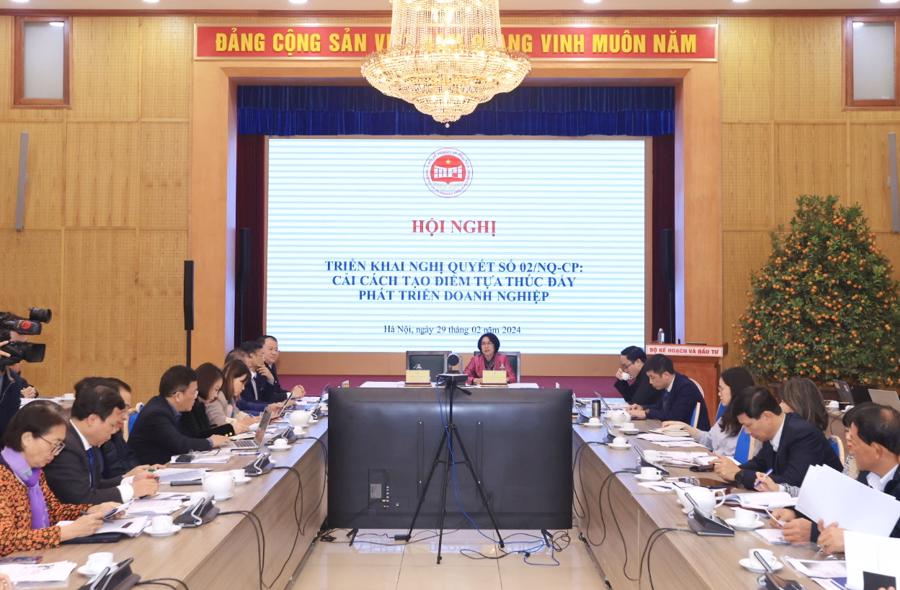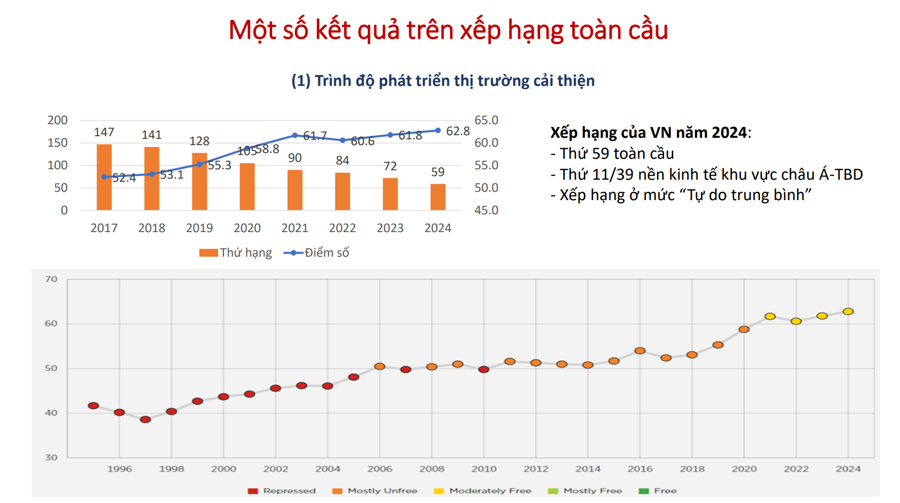Speaking at the Conference “Implementation of Resolution 02/NQ-CP: Reforming the Ecosystem to Promote Business Development” on February 29, Deputy Minister of Planning and Investment Tran Duy Dong said that 2023 is a more difficult year for the business community compared to previous years. The growth of the number of newly established enterprises, the number of enterprises returning to operation, registered capital and labor all decreased compared to the same period in 2022. Meanwhile, the number of enterprises withdrawing from the market was much higher than in the same period.
This trend continues in the early months of 2024. In January 2023 alone, the number of enterprises withdrawing from the market was nearly twice the number of enterprises joining. According to Deputy Minister Tran Duy Dong, this shows the difficulties and challenges that are eroding the resilience of businesses. Therefore, more than ever, efforts to reform the business environment need to be accelerated and effectively implemented to reinforce the trust and business motivation for enterprises.
“At the Ministry of Planning and Investment, when receiving recommendations from businesses regarding policy and legal regulations, if 1-2 businesses have the same recommendation on an issue, the ministry will study it, but if more than 3 businesses have the same recommendation, we consider it a policy task,” Mr. Dong shared about the implementation of Resolution 02.
POSITIVE RESULTS HAVE BEEN RECOGNIZED
Looking back at recent business environment reform activities, Ms. Nguyen Minh Thao, Head of the Business Environment and Competitiveness Research Division, Central Institute for Economic Management (CIEM – Ministry of Planning and Investment), said that some global rankings of Vietnam have been improved.

In particular, Vietnam’s ranking in the market development level for 2024 is 59th globally and 11th out of 39 economies in the Asia-Pacific region, a significant improvement compared to the 72nd position globally in 2023. The ranking for Innovation has also increased by 2 places from the 48th position globally to the 46th position in 2023. Although the Sustainable Development Index has not improved in terms of ranking (ranking 55 in both 2022 and 2023), the score has slightly increased from 72.8 points in 2022 to 73.32 points in 2023. The Logistics Efficiency Index has also improved in scores despite a decrease in ranking.
According to the Vietnam Chamber of Commerce and Industry (VCCI), in recent years, the business environment reform activities have been quite positive from the authorities. From 2021 to 2023, 2,483 business regulations have been cut and simplified in 201 legal documents. The Prime Minister has approved a plan to cut and simplify 1,191 business regulations in 221 legal documents.

“As a result, administrative procedures have become more favorable, business conditions have become simpler, and many reported difficulties have been promptly addressed,” said Mr. Dau Anh Tuan, Deputy Secretary General and Head of the Legal Department at VCCI.
ENTERPRISES STILL SUFFER FROM REGULATIONS
However, according to Mr. Tuan, some of the cut and simplification measures are still in form, and some cost calculations are still inaccurate, and many reported difficulties from businesses have not been considered…
Citing the provision that passenger transport businesses must provide minimum content of transport contracts to the Department of Transport by email before each trip according to Decree 10/2020/ND-CP, a VCCI representative believed that this requirement creates both difficulties for businesses and management agencies.
“Businesses have hundreds of trips every day, and requiring such information creates a high compliance cost. Moreover, the management agencies are also difficult to manage when they receive hundreds of emails every day,” Mr. Tuan said.
According to Ms. Ly Kim Chi, Chairwoman of the Ho Chi Minh City Food Association, in recent times, the institutional and business environment reform has been slowing down, and unnecessary procedures have been added, causing risks and reducing confidence and business motivation for enterprises.
“Recently, there have been cases where large businesses in the food industry have transferred or cooperated with foreign businesses and investment funds. For essential goods that affect national food security, this transfer and cooperation trend is worrying. Therefore, for the food industry, if there is no consistent and comprehensive legal policy from the government to support domestic businesses in reducing pressure and develop with peace of mind, we may suffer great losses as this transfer and cooperation trend increases in the future,” Ms. Chi said.
According to a representative of the Ho Chi Minh City Food Association, one of the longest and most severe regulations affecting food businesses is the obstacle in Decree 09/2016/ND-CP of the Government on fortifying nutrients in food. This limitation has lasted for nearly 7 years since 2017, causing a lot of costs for businesses.
“With the prolonged difficulties from the market and the additional costs of compliance, most small and medium-sized enterprises have little opportunity to recover,” Ms. Chi said, hoping that the implementation of Resolution 02 will comprehensively remove the existing institutional barriers that are affecting business development in 2024.
1. Addressing legal obstacles in the implementation of investment projects;
2. Improving the quality of reforming the list of sectors and business conditions for investment and business;
3. Reforming sectoral inspections of goods and implementing the National Single Window effectively;
4. Enhancing the efficiency of administrative procedure settlement; applying information technology, interoperability, and data sharing;
5. Enhancing access to and absorption of capital for businesses;
7. Enhancing the quality of business development services.












